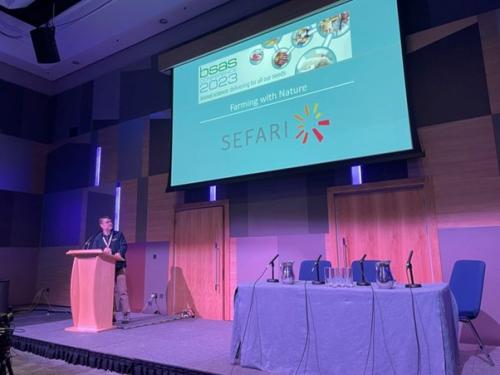SEFARI has a wee bit of ‘previous’ at BSAS, having organised, sponsored and hosted a number of sessions over the past few years, including a panel debate on ‘Can we have our meat and eat it?’ in 2019; a virtual One Health session at the height of COVID in 2021; and a session on ‘Reducing GHGs from animal agriculture’ in 2022.
For this year’s session, we had no hesitation in suggesting ‘Farming with Nature’ – it’s very topical, with lots of media coverage and ongoing discussions around future farm support and ‘public money for public goods’. We also had no hesitation in suggesting our 4 keynote speakers – they’re all very dynamic speakers and experts in their respective fields. We wanted to provide a mix of SEFARI researchers actively engaged in providing evidence around sustainable farming practices, and innovative farmers, who are actually ‘Farming with Nature’ for real – they’re also all Forces of Nature in their own way too!
Our first speaker was Nikki Yoxall, Head of Research at Pasture for Life (i.e. the Pasture-Fed Livestock Association), which supports the link between research and Knowledge Exchange. She is also a livestock farmer and, along with her husband, runs Grampian Graziers up in the NE of Scotland. In her ‘spare’ time, Nikki is doing a PhD in Agroecological Transitions. The focus of Nikki’s presentation was agro-forestry and the benefits of #cowsintrees, not only from an environmental perspective e.g. opening up habitat, improving soil health etc., but also from the animals’ perspective i.e. allowing them to express their own natural behaviours, including self-medicating by grazing on certain plants and leaves.
Image: Nikki Yoxall speaking at the event.
Our second speaker was my Moredun & SEFARI colleague, Dr Fiona Kenyon – Fiona is a Principle Investigator at Moredun, working on sustainable roundworm control in grazing livestock. She is internationally recognised for her research into Targeted Selective Treatment (or TST) strategies, and spoke about how Precision Livestock Farming tools, including electronic ear tags and weigh crates, can be used to contribute to more sustainable livestock farming practices. Such technologies can be employed to identify animals that will benefit from (wormer) treatment. This reduces the amount of chemical used, without losing productivity, which is good for the food chain and the environment, but also slows selection for wormer resistance in the parasite population – win-win!?
Image: Fiona Kenyon speaking at the event.
Our third speaker was Alex Brewster, patching in remotely from Perthshire. Alex is a former Nuffield Scholar and farms at Rotmell, ~1000ha above the River Tay. He was awarded ‘Soil Farmer of the Year’ in 2020, and insists his prize livestock are really only a by-product of his soil and grassland farming prowess! He gave a typically engaging presentation on how he has used his livestock to improve soil health and fertility, but also the species mix and biodiversity of his grass sward. He has also significantly reduced the amount of veterinary medicines he would have used routinely through monitoring the health status of his animals, promoting evidence-based decision-making.
Image: Alex Brewster's presentation at the event.
Our final speaker was Sally-Ann Spence, a card-carrying entomologist, and a Fellow of both the Royal Entomological Society and Linnean Society, as well as an Honorary Associate at the Oxford University Museum of Natural History. She is also a Pasture-Fed Livestock Association (PFLA) accredited livestock farmer and runs the Berrycroft Outreach Hub at her farm in Wiltshire. She also helped set up the DungBeetlesForFarmers website, and gave us a highly authoritative and energetic presentation on their invaluable role as ecological engineers, including helping to fertilise and aerate the soil, and providing a vital food source for endangered bird species. Unfortunately, some of our frontline wormers and flukicides have the potential to impact negatively on dung, soil and aquatic invertebrates, so we need to strike a balance between animal health, welfare and productivity and any adverse environmental impacts, but as Sally-Ann herself said, ‘No dung, no dung beetles!’.
Image:Sally-Ann Spence speaking at the event.
The presentations were followed by a short but lively Q&A panel session, with some searching questions from the audience, both in the room and online. Topics included how to scale up the agro-forestry/silvoculture approach; how Governments could encourage more sustainable approaches, like animal health monitoring; the role of mob grazing and species-rich swards etc.
The session helped raise awareness of some of the issues around ‘Farming with Nature’, the pros and cons, benefits and unintended consequences. There was also a general feeling from some on the panel at least, that the science and, to some extent, government policy was lagging behind what innovative farmers were actually trying to do!
All-in-all an excellent session, and showcase for SEFARI, we look forward to BSAS 2024 in Belfast, we just need to think of a new topic! Any suggestions?
Dr Philip Skuce, Moredun Research Institute.
